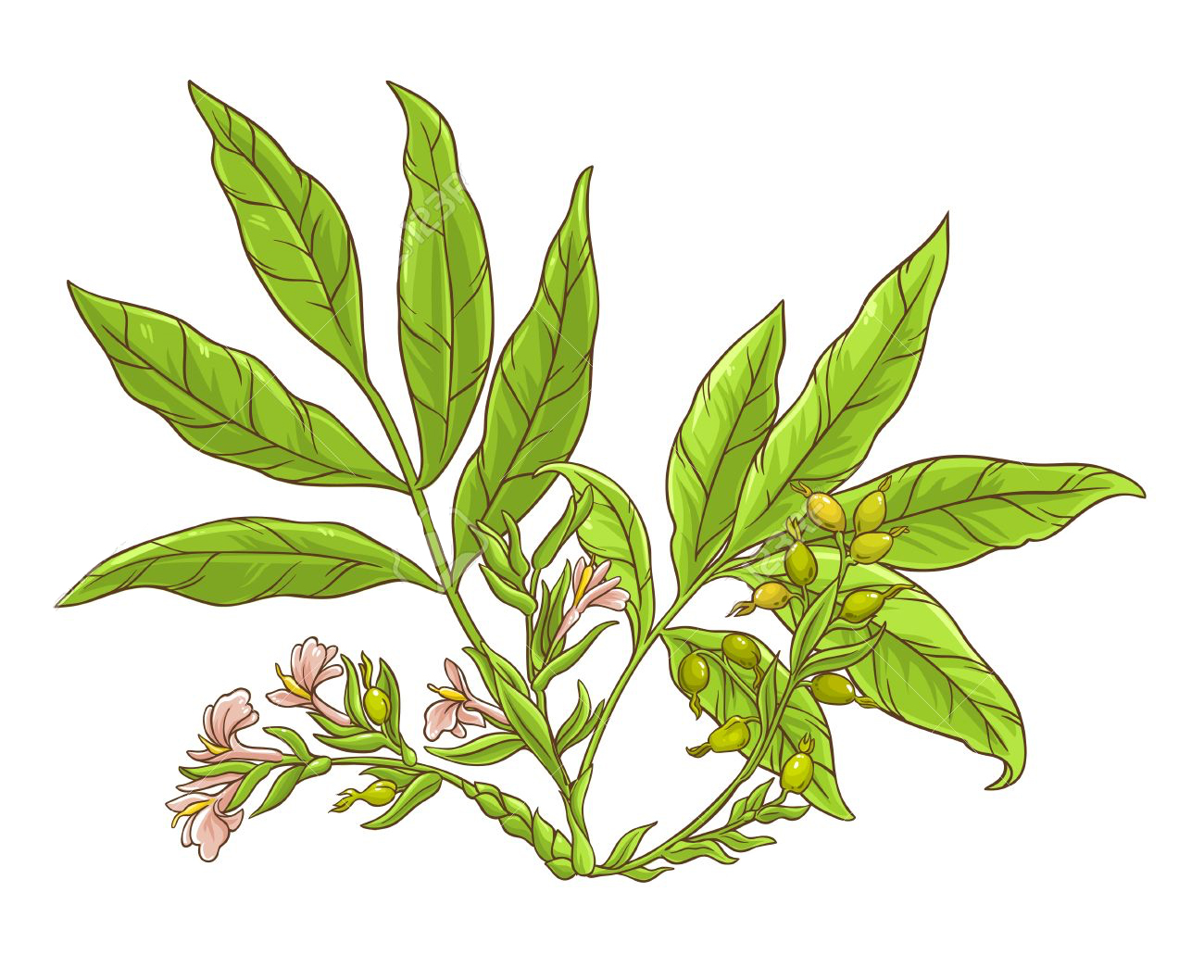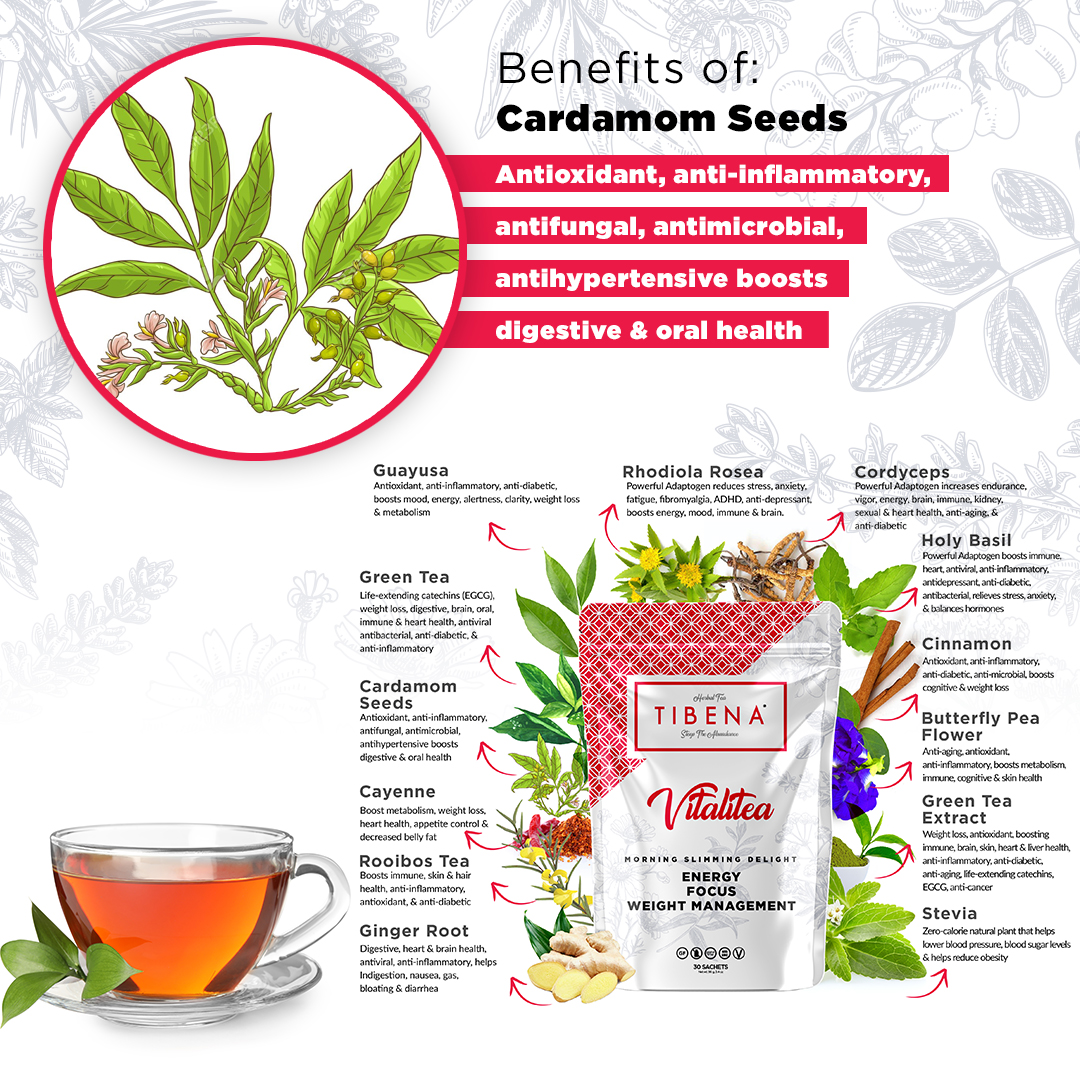
Studies have shown Potential Benefits:
Antioxidant, anti-inflammatory, anti-fungal, anti-microbial, anti-hypertensive, boosts digestive & oral health.
Cardamom Seeds
One of the oldest and most expensive spices in the world. Cardamom is a warming herb and a member of the Ginger family. Both Ayurvedic and Traditional Chinese Medicine hold cardamom in high esteem.
Antioxidant, anti-inflammatory, anti-fungal, anti-microbial, diuretic, helps lower blood pressure, boosts digestive & oral health

https://onlinelibrary.wiley.com/doi/abs/10.1002/jsfa.8414 – Double Blind Clinical Trial – Cardamom improved biomarkers that cause inflammation and disease. Overweight or Obese women who had prediabetes & high cholesterol took cardamom for 8 weeks had lower levels of C-reactive protein, inflammatory proteins, and other markers that have been shown to contribute to health problems.
https://onlinelibrary.wiley.com/doi/abs/10.1002/jsfa.9617 – Placebo controlled trial – 83 people with type 2 diabetes took cardamom or a placebo. Those who took cardamom saw health benefits, including improved hemoglobin A1c & insulin levels after 10 weeks.
https://nutritionandmetabolism.biomedcentral.com/articles/10.1186/s12986-018-0297-4 – Overweight and/or Obese people with nonalcoholic fatty liver disease who took cardamom had improvements in markers in liver health compared to those who took a placebo.
https://pubmed.ncbi.nlm.nih.gov/20361714/ – Three grams of cardamom a day to 20 adults who were newly diagnosed with high blood pressure. After 12 weeks, blood pressure levels had significantly decreased to the normal range.
The promising results of this study may be related to the high levels of the participants’ antioxidant status had increased by 90% by the end of the study. Antioxidants have been linked to lower blood pressure.
https://pubmed.ncbi.nlm.nih.gov/18037596/ – Cardamom has been shown to increase urination and decrease blood pressure. It has been shown to help lower blood pressure, most likely due to its antioxidant & diuretic properties.
https://pubmed.ncbi.nlm.nih.gov/22404574/ – Studies in mice have shown that cardamom can increase the activity of certain enzymes that help fight cancer these findings indicate the potential of cardamom as a chemo-preventive agent against two-stage skin cancer.
https://pubmed.ncbi.nlm.nih.gov/22182368/ – Antioxidant effects of cardamom against non-melanoma skin cancer. Results: Cardamom has a potential to become a pivotal chemo-preventative agent to prevent papillomagenesis on the skin. Two groups of mice were exposed to a compound that causes skin cancer and researchers fed one group cardamom daily. After 12 weeks, only 29% of the group who had daily cardamom developed cancer, compared to over 90% of the control group who did not have cardamom each day.
https://pubmed.ncbi.nlm.nih.gov/26194454/ – Research on human cancer cells and cardamom indicate similar results. One study showed that a certain compound in the spice stopped oral cancer cells in test tubes from multiplying. Certain compounds in cardamom may fight cancer and stop the growth of tumors in mice & test tubes.
https://pubmed.ncbi.nlm.nih.gov/8862535/ – Antioxidants, found in abundance in cardamom, protect cells from damage and stop inflammation from occurring.
https://pubmed.ncbi.nlm.nih.gov/28458157/ – Cardamom inhibited 4 different inflammatory compounds in rats.
https://www.ncbi.nlm.nih.gov/pmc/articles/PMC5557534/ – Cardamom prevents obesity, improves glucose intolerance, inflammation & oxidative stress in liver of high carbohydrate high fat diet induced obese rats.
https://pubmed.ncbi.nlm.nih.gov/16298093/ – Cardamom alone could completely prevent or reduce the size of gastric ulcers by at least 50%. At certain doses cardamom extract was more effective than a common anti-ulcer medication.
https://pubmed.ncbi.nlm.nih.gov/16317658/ – Research suggests that cardamom may protect against Helicobacter pylori, which is linked to the development of most stomach ulcers.
https://www.ncbi.nlm.nih.gov/pmc/articles/PMC3353705/ – Recently, in a study done to explore the antimicrobial effects of cardamom extracts on oral bacteria, it was found that cardamom extracts are effective against oral pathogenic bacteria like Streptococcus mutans and Candida albicans. Cardamom’s ability to fight common mouth bacteria.
https://www.researchgate.net/publication/50874100_Antimicrobial_Activity_of_Amomum_subulatum_and_Elettaria_cardamomum_Against_Dental_Caries_Causing_Microorganisms – Cardamom extracts were effective in fighting five bacteria that can cause dental cavities. https://www.researchgate.net/publication/265974924_ANTIMICROBIAL_AND_SYNERGISTIC_ACTIVITY_OF_INGREDIENTS_OF_BETEL_QUID_ON_ORAL_AND_ENTERIC_PATHOGENS – Research shows that cardamom extract can reduce the number of bacteria in saliva samples by 54%
https://pubmed.ncbi.nlm.nih.gov/28681014/ – Anti-fungal -Cardamom was shown to be helpful in the treatment of Candidiasis (a fungal infection) without causing any side-effects.
https://pubmed.ncbi.nlm.nih.gov/21695005/ & https://pubmed.ncbi.nlm.nih.gov/28714890/ anti-microbial
https://www.ncbi.nlm.nih.gov/pmc/articles/PMC5490299/ – Anti-fungal
https://pubmed.ncbi.nlm.nih.gov/21695005/ – anti-bacterial, Effective against e-coli & staphylococeus bacteria
https://www.ncbi.nlm.nih.gov/pmc/articles/PMC5623966/ – A study in 80 overweight and obese prediabetic women found a link between cardamom and slightly reduced waist circumference.
https://pubmed.ncbi.nlm.nih.gov/10641152/ – Antioxidant
